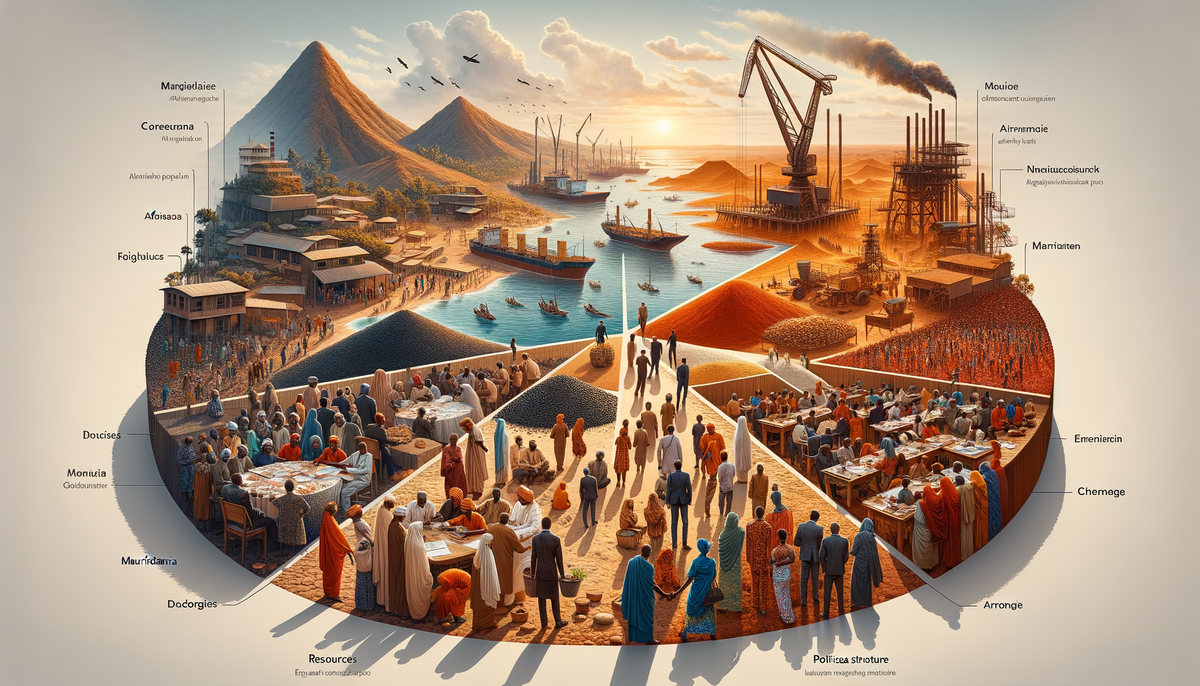Mauritania's Role in Geopolitical and Economic Stability in Africa
Discover Mauritania's strategic role in Africa's geopolitics and economy, exploring its demographics, resources, and political structure.

Mauritania's Role in Geopolitical and Economic Stability in Africa
Mauritania's Role in Geopolitical and Economic Stability in Africa
Mauritania, a country often underestimated in the geopolitical landscape, offers a unique blend of cultures, economic potential, and political significance. Situated in Northwest Africa, Mauritania serves as a bridge between the Arab Maghreb and sub-Saharan Africa, boasting vast swathes of the Sahara Desert and an Atlantic Ocean coastline. This article delves into Mauritania's vital role in the continent's geopolitical and economic framework, supported by insights from Libya Observer, Yabiladi and Ynet News.
Mauritania's Geopolitical Profile
Mauritania is strategically located bordering Algeria, Mali, Senegal, and Western Sahara with a population estimated at around 5 million in 2024. The country's expansive deserts form a natural barrier, shaping its role as a cultural and logistical bridge in the region. Despite its low population density of 5 people per square kilometer, Mauritania's diverse ethnic composition — including Bidhan ("white Moors"), Haratin ("black Moors"), and sub-Saharan ethnic groups like the Wolof and Soninke — reflects its complex socio-cultural fabric.
The Political Landscape of Mauritania
Under the leadership of President Mohamed Ould Cheikh El Ghazouani, Mauritania's political realm is marked by attempts towards stability and reform. After years of coups, the government has focused on anti-corruption measures as part of the "Mon ambition pour la nation" strategy. However, the country's position as a transit point for migration, with approximately 500,000 irregular migrants and 170,000 Malian refugees, continues to pose governance challenges.
Mauritania's Economic Insights
Economically, Mauritania is heavily reliant on its primary sectors: agriculture, livestock, and fisheries, with iron ore mining being a significant economic driver. The country's rich deposits of iron ore, copper, gypsum, and the potential for oil reserves are crucial yet untapped assets. Despite these resources, Mauritania faces considerable economic challenges, such as limited arable land, impacting its development prospects.
Strategic Priorities and Challenges
Moving forward, Mauritania's strategic focus revolves around security enhancement, especially concerning Mali's instability, human capital development via improved education and training, and institutional reforms aimed at increasing foreign investment. Addressing these priorities is crucial for Mauritania to elevate its economic standing and regional influence.
Human Rights and Social Issues
Notably, Mauritania is under international scrutiny for its human rights record, particularly concerning slavery. Although slavery has been criminalized, over 2% of the population is still estimated to be enslaved, spotlighting the need for more stringent enforcement of anti-slavery laws.
Practical Takeaways for Mauritania Professionals
The narrative of Mauritania reveals a landscape ripe for professional engagement and investment. Professionals and businesses can capitalize on initiatives aimed at improving governance, expanding educational infrastructure, and developing economic sectors like mining and fisheries. By participating in these sectors, professionals can drive forward Mauritania's economic agenda.
Exploiting the Opportunities in Mauritania
For businesses and investors, Mauritania's political and economic roadmap offers promising opportunities. Engaging with strategic priorities like security and institutional reforms can create pathways for sustainable development and partnerships.
Call to Action: To explore more about the opportunities in Mauritania and how your business can fit into this dynamic environment, consider reaching out to local agencies and international bodies focused on African development. Embrace the potential for growth and collaboration in one of Africa's most strategically positioned nations.




